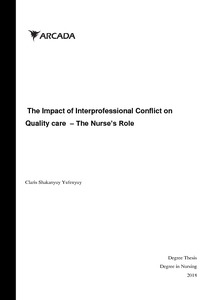Impact of Interprofessional Conflict on Quality Nursing Care - Nurses' role
Yufenyuy Claris, Shakanyuy (2018)
Yufenyuy Claris, Shakanyuy
Yrkeshögskolan Arcada
2018

Creative Commons Attribution-NonCommercial 3.0 Unported
Julkaisun pysyvä osoite on
https://urn.fi/URN:NBN:fi:amk-2018060212062
https://urn.fi/URN:NBN:fi:amk-2018060212062
Tiivistelmä
In healthcare, professionals from different disciplines are involved in the provision of quality care. Collaboration between them is a crucial determinant of the quality of care process. However, these professionals, when working together, have been found to trigger conflict. The purpose of this study is to highlight the causes of team conflict, its effects on quality of care and possible solutions to these conflicts. The research questions are: ’What is conflict in health care? What are the most common areas of conflict between nurses and other healthcare professionals? How does conflict affect quality of care? and What strategies are used for conflict resolution?’. Deborah L. Gladstein’s model of task group effectiveness was used as the theoretical framework. The research method was the literature review of 10 articles which were analyzed using Graneheim & Lundman’s (2003) method of qualitative content analysis. In the findings, conflict was seen to have more of negative effects (destructive effects) on team performance however, for conflict to have positive effects (constructive effects) on team performance, the healthcare professionals were supposed to prevent emotional involvement and view conflict as a means of improving team performance. Nurses played an important part in conflict resolution - acting as mediators, and team members also had a role to play in conflict resolution through communication, cooperation, and respect for one another. Nurses need to be educated on their role in conflict management and more studies should be done on factors preventing conflict resolution.
